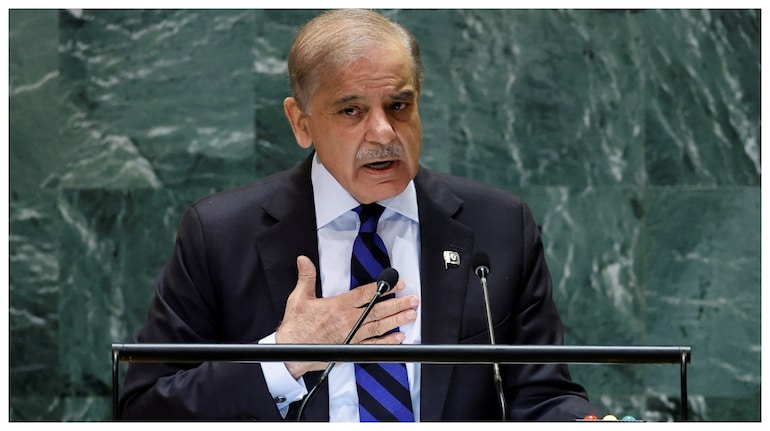



Pakistan has made “significant progress” in stabilising the economy and rebuilding confidence amid a challenging global environment, the International Monetary Fund (IMF) said while approving an additional $2.4 billion package for the country.
India, which is locked in a fierce conflict with Pakistan, had opposed the aid, saying it could be used to fund terror.
“Today, the executive board of the IMF completed the first review of Pakistan’s economic reform program supported by the Extended Fund Facility (EFF) Arrangement,” it said in a statement on May 9.
The decision of IMF’s executive board allows an immediate disbursement of around $1 billion, bringing total disbursements to about $2.1 billion.
In addition, the board approved the authorities’ request for an arrangement under the Resilience and Sustainability Facility (RSF), with access to about $1.4 billion.
New Delhi, which has been opposing the aid, abstained from the vote. India raised long-standing concerns with the IMF that international financial assistance to Pakistan could be diverted to fund military operations or cross-border terrorist activities, the government said in a statement.
“While the concern that fungible inflows from international financial institutions, like IMF, could be misused for military and state-sponsored cross-border terrorist purposes resonated with several member countries, the IMF response is circumscribed by procedural and technical formalities,” the statement said.
“This is a serious gap highlighting the urgent need to ensure that moral values are given appropriate consideration in the procedures followed by global financial institutions.”
Jammu and Kashmir chief Minister Omar Abdullah expressed his disappointment, as the union territory has borne the brunt of Pakistan’s support for terror and now its missiles, drones and shells.
"I’m not sure how the 'International Community' thinks the current tension in the subcontinent will be de-escalated when the IMF essentially reimburses Pakistan for all the ordnance it is using to devastate Poonch, Rajouri, Uri, Tangdhar & so many other places," he said.
Follow our live blog for the latest on the India-Pakistan conflict
'Growth up, inflation down'
In September 2024, the IMF approved a 37-month EEF programme for Pakistan to build “resilience and enable sustainable growth” in the country. The key priorities of the programme include entrenching macroeconomic sustainability through consistent implementation of sound macro policies, including rebuilding international reserve buffers and broadening of the tax base.
The programme also aims to advance reforms to strengthen competition and raise productivity and competitiveness; reform state-owned-enterprises (SOEs) and improve public service provision and energy sector viability.
After the board discussion, deputy managing director Nigel Clarke said Pakistan had made important progress in restoring macroeconomic stability despite a challenging environment.
“Since the approval of the Extended Fund Facility, the economy continues to recover, with inflation sharply lower and external buffers notably stronger,” Clarke said.
“Pakistan’s policy efforts under the EFF have already delivered significant progress in stabilising the economy and rebuilding confidence, amidst a challenging global environment,” the IMF said.
A primary surplus of 2 percent of GDP in the first half of FY25 was keeping Pakistan on track to meet the end-FY25 target of 2.1 percent, it said.
Inflation fell to a historic low of 0.3 percent in April, and progress on disinflation and steadier domestic and external conditions, have allowed the State Bank of Pakistan to cut the policy rate by a total of 1,100 basis points (bps) since June 2025.
Gross reserves stood at $10.3 billion at the end of April, up from $9.4 billion in August 2024 and are projected to reach $13.9 billion by June-end and continue to be rebuilt over the medium term, it said.
The RSF programme will support the authorities’ efforts to reduce vulnerabilities to natural disasters and to build economic and climate resilience.
According to IMF, the programme prioritises resilience to natural disasters and strengthen public investment processes at all levels of government; makes the use of scarce water resources more efficient, including through better pricing; and strengthens coordination of natural disaster response and financing between federal and provincial governments.
"Risks to the outlook remain elevated, however, particularly from global economic policy uncertainty, rising geopolitical tensions, and persistent domestic vulnerabilities,” Clarke said.
The authorities need to maintain sound macroeconomic policies and accelerate reforms to safeguard the macroeconomic gains and underpin stronger and sustainable, private sector-led medium-term growth, he said.
“Accelerating structural reforms will unlock Pakistan’s competitiveness, creating conditions to attract high-impact private investment,” he said. Reducing Pakistan’s vulnerability to extreme weather events will enhance macroeconomic stability and fiscal sustainability.
Discover the latest Business News, Sensex, and Nifty updates. Obtain Personal Finance insights, tax queries, and expert opinions on Moneycontrol or download the Moneycontrol App to stay updated!
Find the best of Al News in one place, specially curated for you every weekend.
Stay on top of the latest tech trends and biggest startup news.